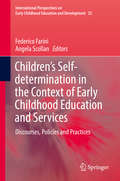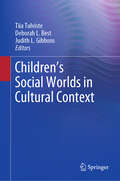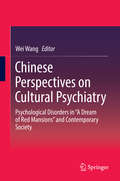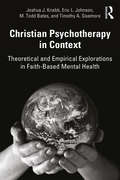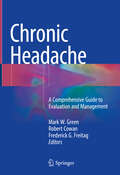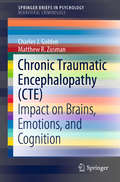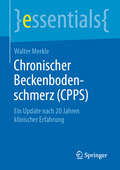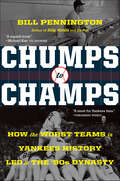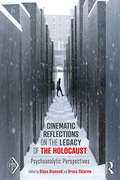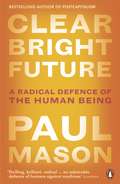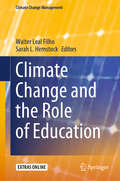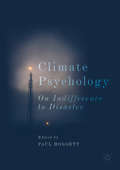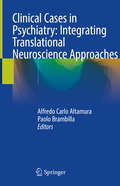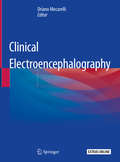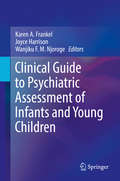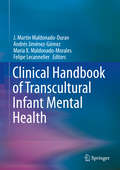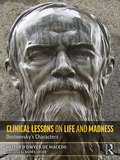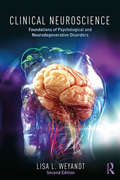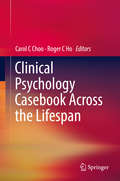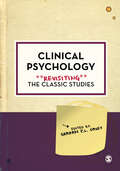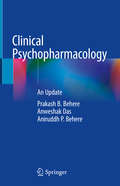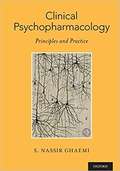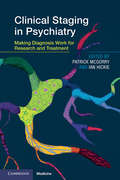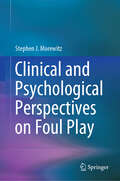- Table View
- List View
Children’s Self-determination in the Context of Early Childhood Education and Services: Discourses, Policies and Practices (International Perspectives on Early Childhood Education and Development #25)
by Federico Farini Angela ScollanThis book investigates the position of young children’s self-determination within a range of social contexts, such as education, social care, mass-media, health, politics, law and the family. It brings to the fore the voices of the children in the present, with their interests, agendas and rights. Based on original primary research, the chapters tackle hegemonic discourses on children’s self-determination as well as current policies and practices. They address a broad range of topics, from the planning of role-play to national policies, from the use of digital technologies for pedagogy to children’s health and well-being, and from democratic practices in the classroom to the preservation of traditional family values. The book presents case studies to unravel how childhood and young children’s self-determination are constructed at the intersection with intergenerational relationships. Coming from different disciplines and using a diverse range of methodological traditions, the contributions in the volume eventually converge to generate a rich, complex and multi-layered analysis of contemporary cultures of childhood and young children’s rights.
Children’s Social Worlds in Cultural Context
by Judith L. Gibbons Tiia Tulviste Deborah L. BestThis book addresses cultural variability in children’s social worlds, examining the acquisition, development, and use of culturally relevant social competencies valued in diverse cultural contexts. It discusses the different aspects of preschoolers’ social competencies that allow children – including adopted, immigrant, or at-risk children – to create and maintain relationships, communicate, and to get along with other people at home, in daycare or school, and other situations. Chapters explore how children’s social competencies reflect the features of the social worlds in which they live and grow. In addition, chapters examine the extent that different cultural value orientations manifest in children’s social functioning and escribes how parents in autonomy-oriented cultures tend to value different social skills than parents with relatedness or autonomous-relatedness orientations. The book concludes with recommendations for future research directions. Topics featured in this book include:Gender development in young children.Peer interactions and relationships during the preschool years.Sibling interactions in western and non-western cultural groups.The roles of grandparents in child development.Socialization and development in refugee children.Child development within institutional care. Children’s Social Worlds in Cultural Context is a valuable resource for researchers, clinicians/practitioners, and graduate students in developmental psychology, child and school psychology, social work, cultural anthropology, family studies, and education.
Chinese Perspectives on Cultural Psychiatry: Psychological Disorders in “A Dream of Red Mansions” and Contemporary Society
by Wei WangThis book presents a longitudinal study of cultural influence on psychiatric disorders, from late imperial China to contemporary China, drawing on both reviews and lab results to do so. While predominantly offering evidence of cultural influences on psychiatric disorders from a Chinese perspective, it will also be of global benefit since “the national exemplifies the international.” It presents the Chinese “emic” components of culture, including Chinese personality traits, Chinese forms of emotional regulation, and Chinese styles of family structure and function, which will stimulate international interest and research in related areas. The intended readership includes cultural psychiatrists and psychologists, family therapists, personality psychologists, literature-related researchers, and members of the general public who are interested in cultures expressed in fictions.
Christian Psychotherapy in Context: Theoretical and Empirical Explorations in Faith-Based Mental Health
by Eric L. Johnson Timothy A. Sisemore Joshua J. Knabb M. Todd BatesChristian Psychotherapy in Context combines theology with the latest research in clinical psychology to equip mental health practitioners to meet the unique psychological and spiritual needs of Christian clients. Encouraging therapists to operate from within a Christian framework, the authors explore the intersection between a Christian worldview and clients’ emotional struggles, drawing from sources including both foundational theological texts and the “common factors” psychotherapy literature. Written collaboratively by two clinical psychologists, an academic psychologist, and a theologian, this book paves the way for psychotherapeutic practice that builds on Christian principles as the foundation, rather than merely adding them to treatment as an afterthought.
Chronic Headache: A Comprehensive Guide to Evaluation and Management
by Mark W. Green Robert Cowan Frederick G. FreitagThis comprehensive, practical title invites all clinicians to take a fresh look at the evaluation and management of chronic daily headache (CDH). Developed by a distinguished international panel of experts, the book examines key social and economic issues around CDH and clarifies the diagnosis of CDH disorders, providing an understanding of the underlying biological substrates, offering guidance on the use of diagnostic testing and additional consultations, and outlining treatment strategies with the greatest potential to alleviate the burden of these patients and to provide the highest quality of care. The book fully examines the constellation of symptoms that constitute chronic daily headache, while also discussing the role of behavioral medicine and the important elements involved in taking a good history. The major forms and biology of chronic daily headache are covered, as is the role of diagnostic testing and treatment. The risk factors that lead patients to transform episodic primary headache disorders into the chronic form are examined. Invasive and neuromodulatory techniques are also discussed. A section on the classification of these disorders rounds out this important contribution to the literature. Chronic Headache – A Comprehensive Guide to Evaluation and Management will be of great interest to neurologists, primary care physicians, nurse practitioners, physician assistants, medical students, and other clinicians with an interest in chronic daily headache.
Chronic Traumatic Encephalopathy: Impact on Brains, Emotions, and Cognition (SpringerBriefs in Psychology)
by Charles J. Golden Matthew R. ZusmanThe term chronic traumatic encephalopathy (CTE) has recently gained a significant amount of media coverage. However, a large proportion of the information disseminated through the media pertaining to the etiology, neuropathology, and clinical manifestations of CTE are not corroborated by empirical research, and are disputed by prominent researchers who study sports related head injury. This book reviews the existing literature pertaining to these components of CTE and includes unique case studies of several retired NFL players that received a comprehensive neuropsychological battery from a board certified neuropsychologist, among other populations. It investigates the claim that CTE causes depression, violent behavior, and an increased risk for suicide by providing an in depth discussion using empirical data. Highlighting the importance of adhering to post concussion protocol and appreciating the long-term consequences of repeated head trauma, this unique review of the current research on CTE will be useful to students and professionals in psychology and neurology.
Chronischer Beckenbodenschmerz: Ein Update nach 20 Jahren klinischer Erfahrung (essentials)
by Walter MerkleChronischer Beckenbodenschmerz (CPPS) ist ein vorwiegend in der Urologie beheimatetes Krankheitsbild, das aber häufig auch interdisziplinär auftreten kann und dann fachübergreifend diagnostiziert und behandelt werden muss. Walter Merkle betrachtet in diesem Überblick vor allem die urologischen Erscheinungsformen, arbeitet jedoch die interdisziplinären Zusammenhänge ein. Er plädiert an die Ärzteschaft, das Krankheitsbild des CPPS verstärkt zu beachten, da dieses oft unzureichend diagnostiziert und behandelt wird. Essentiell ist dabei, sich von der alleinigen Sichtweise aus dem Fachgebiet der Urologie zu lösen und sich unbedingt interdisziplinär auf Empathie, Psychosomatik und Osteopathie sowie Biofeedbacktherapie einzulassen, um erfolgreich diagnostizieren und behandeln zu können.Der Autor: Dr. Walter Merkle war im Fachbereich Urologie der Deutschen Klinik für Diagnostik GmbH in Wiesbaden tätig.
Chumps To Champs: How the Worst Teams in Yankees History Led to the '90s Dynasty
by Bill PenningtonThe untold story of the years when the Yankees were a laughingstock—and how out of that abyss emerged the modern Yankees dynasty, one of the greatest in all of sports The New York Yankees have won 27 world championships and 40 American League pennants, both world records. They have 26 members in the Hall of Fame. Their pinstripe swag is a symbol of &“making it&” worn across the globe. Yet some 25 years ago, from 1989 to 1992, the Yankees were a pitiful team at the bottom of the standings, sitting on a 14-year World Series drought and a 35 percent drop in attendance. To make the statistics worse, their mercurial, bombastic owner was banned from baseball. But out of these ashes emerged a modern Yankees dynasty, a juggernaut built on the sly, a brilliant mix of personalities, talent, and ambition. In Chumps to Champs, Bill Pennington reveals a grand tale of revival. Readers encounter larger-than-life characters like George Steinbrenner and unexplored figures like Buck Showalter (three-time manager of the year), Don Mattingly, and the crafty architect of it all, general manager Gene Michael, who assembled the team&’s future stars—Rivera, Jeter, Williams, O&’Neill, and Pettitte. Drawing on unique access, Pennington tells a wild and raucous tale.
Cinematic Reflections on The Legacy of the Holocaust: Psychoanalytic Perspectives (Psychoanalytic Inquiry Book Series)
by Diana Diamond Bruce SklarewAn international group of psychoanalysts and film scholars address the enduring emotional legacy of the Holocaust in Cinematic Reflections on the Legacy of the Holocaust: Psychoanalytic Perspectives. Particular focus is given to how second and third generation survivors have explored and confronted the psychic reverberations of Holocaust trauma in cinema. This book focuses on how film is particularly suited to depict Holocaust experiences with vividness and immediacy. The similarity of moving images and sound to our dream experience allows access to unconscious processing. Film has the potential to reveal the vast panorama of Holocaust history as well as its intrapsychic reverberations. Yet despite the recent prominence of Holocaust films, documentaries, and TV series as well as scholarly books and memoirs, these works lack a psychoanalytic optic that elucidates themes such as the repetition compulsion, survival guilt, disturbances in identity, and disruption of mourning that are underlying leitmotifs. Cinematic Reflections on the Legacy of the Holocaust will be of great interest to psychoanalysts and therapists as well as to scholars in trauma, film, and Jewish studies. It is also of interest to those concerned with the prevention of genocide and mass atrocities and their long-term effects.
Clear Bright Future: A Radical Defence of the Human Being
by Paul MasonA passionate defence of humanity and a work of radical optimism from the international bestselling author of PostcapitalismHow do we preserve what makes us human in an age of uncertainty? Are we now just consumers shaped by market forces? A sequence of DNA? A collection of base instincts? Or will we soon be supplanted by algorithms and A.I. anyway?In Clear Bright Future, Paul Mason calls for a radical, impassioned defence of the human being, our universal rights and freedoms and our power to change the world around us. Ranging from economics to Big Data, from neuroscience to the culture wars, he draws from his on-the-ground reporting from mass protests in Istanbul to riots in Washington, as well as his own childhood in an English mining community, to show how the notion of humanity has become eroded as never before.In this book Paul Mason argues that we are still capable - through language, innovation and co-operation - of shaping our future. He offers a vision of humans as more than puppets, customers or cogs in a machine. This work of radical optimism asks: Do you want to be controlled? Or do you want something better?
Climate Change and the Role of Education (Climate Change Management)
by Walter Leal Filho Sarah L. HemstockThis book offers insights into the educational dimensions of climate change and promotes measures to improve education in this context. It is widely believed that education can play a key role in finding global solutions to many problems related to climate change. Indeed, education as a process not only helps young people to better understand and address the impact of global warming, but also fosters better attitudes and behaviours to aid efforts towards mitigating climate change and adapting to a changing environment. But despite the central importance of education in relation to climate change, there is a paucity of publications on this theme. Against this background, the book focuses on the educational aspects of climate change and showcases examples of research, projects and other initiatives aimed at educating various audiences. It also provides a platform for reflections on the role education can play in fostering awareness on a changing climate. Presenting a wide range of valuable lessons learned, which can be adapted and replicated elsewhere, the book appeals to educators and practitioners alike.
Climate Psychology: On Indifference to Disaster (Studies in the Psychosocial)
by Paul HoggettThis book investigates the psycho-social phenomenon which is society’s failure to respond to climate change. It analyses the non-rational dimensions of our collective paralysis in the face of worsening climate change and environmental destruction, exploring the emotional, ethical, social, organizational and cultural dynamics to blame for this global lack of action. The book features eleven research projects from four different countries and is divided in two parts, the first highlighting novel methodologies, the second presenting new findings. Contributors to the first part show how a ‘deep listening’ approach to research can reveal the anxieties, tensions, contradictions, frames and narratives that contribute to people’s experiences, and the many ways climate change and other environmental risks are imagined through metaphor, imagery and dreams. Using detailed interview extracts drawn from politicians, scientists and activists as well as ordinary people, the second part of the book examines the many different ways in which we both avoid and square up to this gathering disaster, and the many faces of alarm, outrage, denial and indifference this involves.
Clinical Cases in Psychiatry: Integrating Translational Neuroscience Approaches
by Alfredo Carlo Altamura Paolo BrambillaThis case series book offers a practical and accessible approach to psychiatry, addressing major clinical problems ranging from psychosis to aging effects, each of which is tackled as it arises in everyday settings. With its emphasis on everyday practice strongly linked to underlying theory, the book combines clinical knowledge with the realities of managing clinical problems, and will provide a basis for developing sound analytical and confident decision-making skills. Presenting different visions of clinical psychiatry and expanding psychiatrists’ interventions by integrating innovative neuroscience approaches such as neuroimaging, neuropsychology, TMS and cognitive rehabilitation, it will help clinicians and students alike gain a sound understanding of the wide range of signs and symptoms that indicate psychiatric disorders, and how the diagnosis, management and treatment options can differ from those in other medical specialties. The volume includes learning activities, with questions on each clinical case followed by detailed explanatory answers, and self-assessment exercises to assist with learning and revision. Throughout the book, tips and key features are highlighted with boxes, algorithms, tables and figures, which the reader can refer back to for exam revision and well into her/his career.
Clinical Electroencephalography
by Oriano MecarelliThis book describes the developments and improvements in electroencephalography (EEG). In recent years, digital technology has replaced analog equipments, and it is now possible to easily record and store EEG tracings and to quickly recall previously acquired material for subsequent analysis. In addition, not only static figures, but also electronic supplementary materials can be included in books, enabling EEGs to be viewed in real-time.In clinical practice, EEG still represents the most important functional examination in the study CNS development and its anatomical and physiological integrity throughout life. In the pathological context, EEG provides indispensable diagnostic information for classification of epileptic syndromes, and it is also valuable in all the other CNS diseases (infectious, cerebrovascular, neurodegenerative, etc).Furthermore, monitoring EEG can be widely used in emergency settings, such as emergency departments or intensive care units. In comatose patients, EEG provides information regarding prognosis and evaluation of the sedative effect of anesthetic drugs.Written by a group of leading national and international experts, it offers a substantial, yet practical, EEG compendium, which serves as a reference resource for physicians and neurodiagnostic technologists as well as physicians-in-training, researchers, practicing electroencephalographers and students.
Clinical Guide to Psychiatric Assessment of Infants and Young Children
by Karen A. Frankel Joyce Harrison Wanjiku F. M. NjorogeThis book provides a clinical guide to the psychiatric assessment of infants and young children, birth through five years, and their families. It offers a comprehensive, data-rich framework for conducting mental health assessments of infants, toddlers, and preschoolers. The book includes a step-by-step guide for evaluation and assessment, reviewing relevant literature and best practices for working with very young children. It begins with an overview of the purpose and principles of psychiatric assessment and offers a protocol for planning and executing a thorough evaluation. Chapters examine critical aspects of the assessment process, including children’s relationships with parents/caregivers, assessment of parents, cultural considerations, and play behaviors. Chapters also provide illustrative case vignettes and information on specialized tools that can be adapted for use in a private office or training clinic.
Clinical Handbook of Transcultural Infant Mental Health
by Felipe Lecannelier J. Martin Maldonado-Duran Andrés Jiménez-Gómez Maria X. Maldonado-MoralesThis handbook provides a review of relevant topics concerning the interface between culture and mental health, with a particular focus on child-rearing practices and transcultural issues in the perinatal period, infancy, and early childhood. It discusses how to work with infants and families from diverse backgrounds and addresses the most common issues that medical and mental health experts may encounter when working with individuals from other cultures. Chapters examine the considerable range of child-rearing strategies and how families from various cultural groups approach issues such as infant sleep, feeding practices, and care during pregnancy. In addition, chapters address conditions that are seen mostly within a particular sociocultural context and are “culture bound” syndromes or states. The handbook concludes with the editors’ recommendations for future research directions. Topics featured in this handbook include:Prejudice, discrimination, and stereotyping within the clinical field.Cultural responses to infant crying and irritability.Cultural issues in response to chronic conditions and malformations in infancy.The healthy immigrant effect.The use of folk and traditionally therapeutic remedies. The Clinical Handbook of Transcultural Infant Mental Health is an essential resource for researchers, clinicians and related professionals, and graduate students in infancy and early child development, child and school psychology, pediatrics, social work, obstetrics, and nursing.
Clinical Lessons on Life and Madness: Dostoevsky's Characters
by Heitor O’Dwyer de MacedoThe author of Clinical Lessons on Life and Madness: Dostoevsky’s Characters draws on Dostoevsky's universe to illuminate psychoanalytic theory and practice. Using Dostoevsky’s characters as case studies, the author discusses the various psychoanalytic concepts they embody, and shows how these insights can be applied to therapeutic understanding. By considering the people who populate Dostoevsky’s world as personifying a whole spectrum of human possibilities and modes of relation, Heitor O'Dwyer de Macedo’s discussion of the characters – including those from Notes from Underground, Crime and Punishment and The Brothers Karamazov – allows him to explore fundamental issues constitutive of clinical practice, such as trauma, fantasy, perversion and madness. Clinical Lessons on Life and Madness will provide an important resource for psychoanalysts with an interest in literature, as well as students of literature seeking a psychoanalytic interpretation.
Clinical Neuroscience: Foundations of Psychological and Neurodegenerative Disorders
by Lisa WeyandtClinical Neuroscience offers a comprehensive overview of the biological bases of major psychological and psychiatric disorders and provides foundational information regarding the anatomical and physiological principles of brain functioning. In addition, the book presents information concerning neuroplasticity, pharmacology, brain imaging and brain stimulation techniques, followed by chapters addressing specific psychological disorders and neurodegenerative diseases, including Major Depressive and Bipolar Disorders, Anxiety, Schizophrenia, Disorders of Childhood Origin, Addiction, as well as neurodegenerative disorders such as Parkinson’s and Alzheimer’s Disease. This highly readable textbook expands case examples and illustrations to discuss the latest research findings in clinical neuroscience from an empirical, interdisciplinary perspective.
Clinical Psychology Casebook Across the Lifespan
by Carol C Choo Roger C HoThis book illustrates the multifaceted applications of clinical psychology in multi-cultural contexts. It considers people’s emotional, cognitive, interpersonal and psychological development across their lifespans. The book explores nine multicultural clinical cases that illustrate clinical assessment, biopsychosocial formulation, and evidence-based therapy. Further, it provides therapy outcomes for diverse clients throughout their lifespans, e.g. for cognitive behavioral therapy, integrative therapy, and narrative therapy; and examines clinical findings on e.g. social and emotional development, family trauma, child sexual abuse and its impact, as well as culturally sensitive assessment and interventions for a range of mental health issues. Further cases focus on co-morbid conditions, and physical ailments, across the lifespan.Bringing together contributions from both academics and practitioners, the book illustrates practical applications of theories and concepts relevant to the practice of clinical psychology. It also reviews the relevant literature with clinical recommendations, and provides multicultural perspectives and insights into contemporary clinical approaches from experienced clinical supervisors and practitioners, who are also academics and educators in the field. Accordingly, the book offers a valuable asset for students, academics, researchers and practitioners, as well as for postgraduate clinical training.
Clinical Psychology: Revisiting The Classic Studies (Psychology: Revisiting the Classic Studies)
by Graham C.L. DaveyClinical Psychology: Revisiting the Classic Studies traces 14 ground-breaking studies by researchers such as Leo Kanner, David T. Lykken and Aaron T. Beck to re-examine and reflect on their findings and engage in a lively discussion of the subsequent work that they have inspired. Revisiting the Classic Studies is a series of texts that introduces readers to the studies in psychology that changed the way we think about core topics in the discipline today. It provokes students to ask more interesting and challenging questions about the field by encouraging a deeper level of engagement, both with the details of the studies themselves and with the nature of their contribution. Written by researchers at the cutting edge of these developments, the chapters in each text provide details of the original works, as well as their theoretical and empirical impact.
Clinical Psychology: Revisiting The Classic Studies (Psychology: Revisiting the Classic Studies)
by Graham C.L. DaveyClinical Psychology: Revisiting the Classic Studies traces 14 ground-breaking studies by researchers such as Leo Kanner, David T. Lykken and Aaron T. Beck to re-examine and reflect on their findings and engage in a lively discussion of the subsequent work that they have inspired. Revisiting the Classic Studies is a series of texts that introduces readers to the studies in psychology that changed the way we think about core topics in the discipline today. It provokes students to ask more interesting and challenging questions about the field by encouraging a deeper level of engagement, both with the details of the studies themselves and with the nature of their contribution. Written by researchers at the cutting edge of these developments, the chapters in each text provide details of the original works, as well as their theoretical and empirical impact.
Clinical Psychopharmacology: An Update
by Prakash B. Behere Anweshak Das Aniruddh P. BehereThis book provides practical information on how to use various psychotropic drugs in clinical practice, focusing on their mechanisms of action on receptors and enzymes in the brain. Divided into 11 chapters, it covers all main drug classes, with a dedicated chapter each on special populations and upcoming drugs. All the drugs discussed are presented in the same design format in order to facilitate rapid access to information. Specifically, each drug is individually divided into sections - its history and introduction, classification, pharmacological action, doses, drug interactions, indications, side effects and special populations. Only the essential facts about each drug have been included, so as to make the content concise and to avoid dilution of important information. To aid with review, key points are summarized at the end of each chapter.
Clinical Psychopharmacology: Principles And Practice
by S. Nassir GhaemiClinical Psychopharmacology offers a comprehensive guide to clinical practice that explores two major aspects of the field: the clinical research that exists to guide clinical practice of psychopharmacology, and the application of that knowledge with attention to the individualized aspects of clinical practice. The text consists of 50 chapters, organized into 6 sections, focusing on disease-modifying effects, non-DSM diagnostic concepts, and essential facts about the most common drugs. This innovative book advocates a scientific and humanistic approach to practice and examines not only the benefits, but also the harms of drugs. Providing a solid foundation of knowledge and a great deal of practical information, this book is a valuable resource for practicing psychiatrists, psychiatric nurse practitioners, medical students and trainees in psychiatry, as well as pharmacists.
Clinical Staging in Psychiatry: Making Diagnosis Work for Research and Treatment
by Patrick D. McGorry Ian B. HickiePsychiatric diagnosis is experiencing a crisis of confidence. Current approaches are outmoded with reform desperately needed. Clinical staging is a solution to this crisis. Clinical staging addresses the limitations of current diagnostic systems by recognising the full continuum or trajectory of mental illness from asymptomatic to chronic illness. It acknowledges the overlap between mental health symptoms during early stages and directly links each stage to treatment and underlying cognitive, neurological and biological changes. This approach enhances chances of early identification, promotes the implementation of safer treatments, and increases opportunities to alter the negative trajectory of mental disorders. This book comprehensively describes the conceptual basis of clinical staging in psychiatry, details current progress in identifying biomarkers for each stage, and explores the implications of staging on treatment and health systems. This book provides a foundation for transformational reform in psychiatric diagnosis.
Clinical and Psychological Perspectives on Foul Play
by Stephen J. MorewitzClinical and Psychological Perspectives on Foul Play examines a wide range of factors that can influence how police determine foul play in possible homicide cases and in other possible crimes. It develops a new theory of uncertainty at micro, meso, and macro levels to explain how law professionals arrive at this decision. Specifically, it examines the extent to which uncertainty in these situations can be influenced by media coverage, family and community pressures, socioeconomic factors, demographic elements of victims, as well as police knowledge and resources. Written for forensic practitioners, this book describes how these professionals can consult with law enforcement on such issues as the staging of crime scenes to mask intent, the initiation of community strategies to find missing persons, and the reliability of behavioral profiles. The latest research from the Foul Play Project and the Missing Persons Project are employed to support the recommendations in this book and to point the way toward further research in this area.
